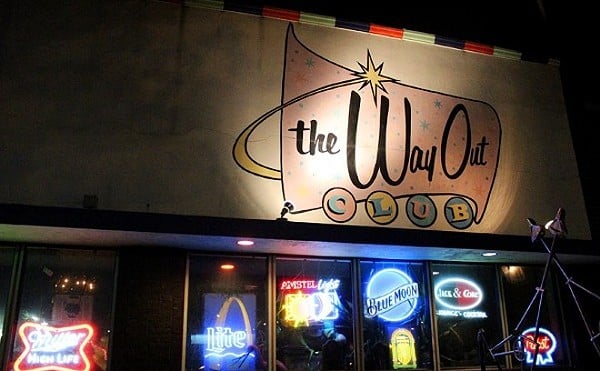An archived copy of Tegan and Sara's website, circa 1999, shows a photo of the Quin sisters in full-blown defiant woodland-creature mode. One looks like Sonic the Hedgehog, thanks to spiky, windblown, blond-streaked hair and a pair of sunglasses atop her head; the other looks like a big softy trying to seem tough, with her scrunched-up face, labret piercing and a close-cropped 'do. Someone's making a devil horn; it's slightly out of focus.
The snapshot is at once playful and rebellious, innocent and goofy, vulnerable and tough — and it rather succinctly sums up Tegan and Sara's appeal. The 29-year-old identical twins have amassed a huge, loyal fanbase by being unabashed romantic warriors. Since signing to Vapor Records (Neil Young's label) in 2000, they've released five albums; on each, they've worked through makeups and breakups, and described how they found love — and lost it again — in great detail.
Its music isn't easily described, though. While roughly filed under "moody folk-pop with new-wave and punk undertones," Tegan and Sara doesn't fit neatly into any genre. It's opened for Rufus Wainwright, the Killers, Neil Young and Ryan Adams, and recently collaborated with superstar DJ Tiësto on a pulsing goth-trance tune. And 2007's The Con was its lushest album yet, full of keyboards and twinkling percussion.
The release of last year's Sainthood found Tegan and Sara embracing a raw, rock-oriented sound —which made absolute sense in the context of its career arc.
"With each record Sara and I obviously are looking to reflect the natural evolution of our band," says Tegan Quin via phone from her home in Vancouver. "Our songwriting has developed and changed based on what we're listening to and how we're influencing one another — and also what worked and what didn't work.
"With each record there's a natural evolution that comes from two years of touring. With Sainthood the biggest challenge was figuring out how to approach the next two years, before we were there. What kind of record did we want to make — and in turn, what kind of audience did we want to attract, and what kind of shows did we want to play? And when you're writing a record, you shouldn't really be thinking about anything but the songs, but it's just natural that you think about all of those other things."
At this stage in Tegan and Sara's career, however, such foresight is necessary. Since Sainthood's release, the band's been on the road almost nonstop — and has even bigger tours already lined up for the rest of the year. Mega pop-rockers Paramore recently asked the band to open for them on the Honda Civic Tour, which will play outdoor amphitheaters this summer.
To record Sainthood Tegan and Sara eschewed the methods that birthed The Con. Instead, the sisters tracked and worked through their new songs live in the studio. Both credit the album's co-producer, Chris Walla, for encouraging them to approach Sainthood in a different way.
"He was like, 'You guys are a live band! You tour all the time, and I want to make a record that's really easy for you guys to go out and play live,'" Tegan says. "The Con was really difficult to translate live, because it was so big — there were just so many tracks and so many guitars and so many keyboards and so many background vocals. It was so hard to make a live show work.
"It took a year and a half to really get to a place where I felt like [The Con's] songs translated well live. We really tried, with Sainthood, to make every song transferable from the record onto a live stage. That was the biggest challenge, [figuring out] how to create an amazing, lush, beautiful rock record, while still keeping in mind that we're just five people on the road."
For Sara Quin, approaching the new songs this way "terrified" her. "I've always felt like Tegan and I, we always stayed away from playing in band environments because we saw ourselves as being these very independent, insular artists," she says in a separate interview. "I actually record most of what I do in the closet, alone, hiding from most people. To put myself in a creative environment with a bunch of other musicians is one of my worst nightmares."
Still, the band backing Tegan and Sara in the studio had to reassure: Walla played bass and enlisted drummer Jason McGerr — his bandmate in Death Cab for Cutie — for the rhythm section. (Guitarist/keyboardist Ted Gowans, who plays in Tegan and Sara's touring band, rounded out the lineup.) Chemistry is a funny thing, and even the most talented musicians don't always gel creatively when they're thrown together. But that wasn't the case here.
"As soon as we started, I just knew it was working," Sara says. "We were maybe three or four days in, and I was dying to get to the studio. To play with Jason McGerr and Chris Walla — they're both such great musicians. To have to sit in a room and stare at one another...my inner dialogue sort of went from, 'Oh my God, oh my God, oh my God, I don't have the chops to play with them,' to 'You can do this.' It really inspired me to really focus and be better at writing parts and playing and listening to the band as a band, instead of just thinking, 'I'm at the head of this pack, you all follow me.' It became a collaborative, sharing process."
Sainthood's music is at once sophisticated and accessible, and rich with sonic texture. The start of "Arrow" features riffs manipulated to sound like cranking gears, while "Someday" fizzes with candy-coated keyboards and playful harmonies, à la Mates of State. And yet the album isn't all pretty pop: "Hell" and "Northshore" are punk-folk barnburners, while melancholy mood pieces such as "On Directing" and "The Cure" resemble gloomy alt-rock from the '80s. In fact, it's not a stretch to say that on Sainthood, Tegan and Sara very much feel like this century's worthy successor to the Cure.
The album's title comes from the Leonard Cohen song, "Came So Far for Beauty"; Sara used lyrics from Cohen's song in what was going to be the title track of the record. While the song didn't make the album (they couldn't get clearance to use the lyrics), the essence of its words still haunt Sainthood.
"It had absolutely become part of the record — the idea of sainthood, and the idea of working at something and almost going to great lengths to change yourself to be the perfect person for someone, and practicing at being good," Tegan says. "It all really summed up exactly where we were on the record. It was second-best to just have the title and not have the song, but in the end, it ended up being the right decision, and I'm glad for it.
"The idea of sainthood and this record — Sara and I were both on the verge of being in new relationships and dating," Tegan adds a few minutes later. "And with that comes a lot of anxiety, because you don't want to bring all this shit from your past into the relationship, but you also don't want to ignore everything that's happened in the past.
"It's important to have this almost report card to remind yourself of what works and what didn't work. It's important that a lot of the work that you do is done on your own," she continues. "You don't want to change for someone else, but you do want to change something, so you don't repeat the same mistakes. The song, the themes and the context of the songs created this really amazing place for Sara and I to play with ideas and themes."
And yet when reading over Sainthood's lyrics, these ideas aren't obvious or direct; they've been manipulated and modified so that the themes need several close readings to parse. It's just another example of how smart their music is — and what makes Tegan and Sara so appealing.
"I trust that we've made something that anyone who already likes our band is going to like," says Sara Quin. "Even though I feel like it's a leap forward, I don't think it's a leap forward that's going to turn off anyone who's ever been into our music. But I also think that this record, more than any other record — the nature of the way it was recorded and the vibe of it and the sound of it — I really feel like this could be a great record for us to open up our fanbase."





